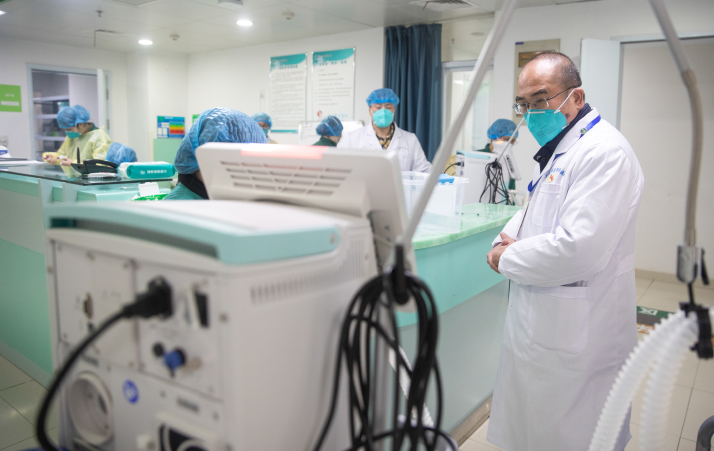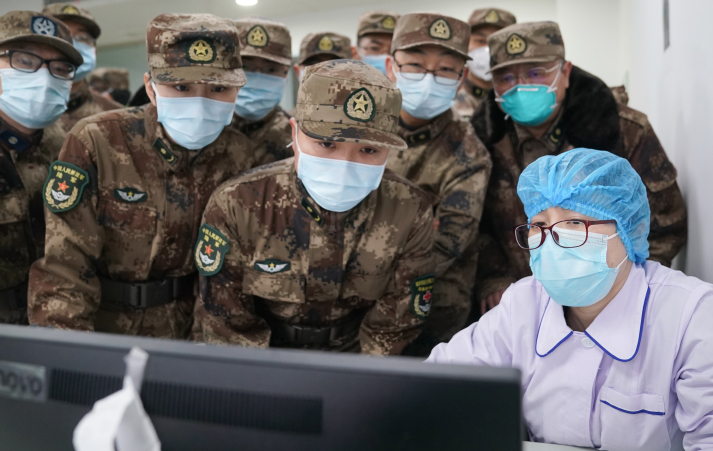|
||||||
|
||||||
| Home Nation World Business Opinion Lifestyle China Focus ChinAfrica Video Multimedia Columnists Documents Special Reports |
|
||||||
|
||||||
| Home Nation World Business Opinion Lifestyle China Focus ChinAfrica Video Multimedia Columnists Documents Special Reports |
| Nation |
| Racing Against Time |
| Doctor with ALS works on the frontline of battle against 2019-nCoV |
| By Li Qing · 2020-02-08 · Source: NO.6-7 FEBRUARY 13, 2020 |
 Zhang Dingyu, President of the Jinyintan Hospital in Wuhan in central China at work on January 27 (XINHUA)
On December 29, 2019, seven cases of pneumonia of unknown cause were referred to the Jinyintan Hospital in Wuhan, Hubei Province in central China. They were all related to the Huanan Seafood Wholesale Market. As similar cases began to be reported in Wuhan, 57-year-old Zhang Dingyu, President of the hospital, was on high alert. His decades of clinical experience told him it was not an ordinary infectious disease. He ordered to move the patients into an isolation ward. Examining their symptoms and analyzing the results, he realized the situation was worse than he had imagined. The next morning, he urgently deployed more medical personnel in two new separated areas, admitting over 80 patients. On the same day, the National Health Commission noticed the spread of viral pneumonia in Wuhan. It was announced on January 8 that the cause of the pneumonia was the novel coronavirus (2019-nCoV). Including Zhang, over 600 medical workers at the hospital have overworked for more than one month. "We need to compete against time in order to get more patients back from the epidemic," he told state broadcaster China Central Television (CCTV). Few people know it is also a personal race for Zhang, who has amyotrophic lateral sclerosis (ALS), a neurological disorder also known as Lou Gehrig's disease. Overcoming limitations The hospital, a designated facility for treating infectious diseases, is one of the most important battlefronts for novel coronavirus infection. Initially, in the face of the epidemic outbreak, the largest challenge for Zhang and his hospital was how to allocate the limited resources to deal with an increased number of patients. The intensive care unit wards did not have enough beds, so more departments had to be used to accommodate more patients. The doctors and nurses of each department were ready to do so. Since the medical staff had to work four to five hours without a break, Zhang worried that physical exhaustion could increase their risk of being infected. Normally, nurses change shifts every two hours. "My colleagues have made their utmost efforts to save the patients' lives. Compared to them, my tasks are much easier," he said, although he managed to get only two or three hours' sleep every day, during which he still needed to answer phones. Zhang did not tell his colleagues except Wang Xianguang, another member of the hospital leadership, that he has ALS, which makes walking difficult for him. He did not want to affect others' work, especially in this critical phase. "Tasks such as admitting and transferring patients are not part of his work, but he still comes to the wards and checks details," Zhang Li, a doctor at the hospital, told Xinhua News Agency. "He can always offer solutions when we meet difficulties," she said, appreciating his decisive style and carefulness. On January 24, 150 medical workers from the Army Medical University in Chongqing were dispatched to the hospital as reinforcement, followed by a medical team of 136 from Shanghai taking charge of some wards. Their timely help relieved the pressure on the staff at the hospital, which also allowed Zhang Dingyu to make his health condition public. The staff of the hospital finally came to know the real reason their chief could not walk normally. They had been told that he had a knee problem.  Staff from the Army Medical University are briefed in the Jinyintan Hospital on January 26 before the university's medical detachment takes over two wards of the hospital (XINHUA)
Challenges in life Telling the truth makes Zhang Dingyu feel better. "I also want to tell people that if they take responsibility and push their boundaries, they can make things happen too," he said. The intense work has worsened his health. He has felt his muscles atrophying. "I need colleagues to help me put on a protective suit as it is difficult for me to lift my legs," he told CCTV. But he still told Wang not to stop him from working in the hospital. "He said time is precious to him and he wants to do more meaningful things within the limited time," Wang said. Zhang Dingyu has been on the frontline of medical emergencies, including the Wenchuan earthquake in the southwestern province of Sichuan in 2008, and overseas medical relief missions to Algeria and Pakistan. He enjoys working with his colleagues and hopes to continue as long as he can. But he also knows that ALS is like a sword hanging over him and will give him at most 10 years. Despite the brutal reality, he still holds a positive attitude. Diseases are caused by mutations, such as genetic mutations, which cannot be controlled by human intervention, so there is no use complaining or being fearful. He said the last years of his life will be confined to the wheelchair or bed, so he needs to make full use of the present time to work and realize his ideas. On January 13, Zhang's wife also developed symptoms of 2019-nCoV infection, which made him cry. She is a doctor working in another hospital in Wuhan. Believing she was in capable hands, Zhang chose to stay with his colleagues fighting against the disease. "Maybe I'm a good doctor but not a great husband," Zhang said. When seeing patients suffering from the disease, he would worry about his wife, fearing of losing her. Then the good news came that she had recovered. And with the efforts of the medical personnel at the Jinyintan Hospital, over 70 patients have recovered and been discharged. Copyedited by Madhusudan Chaubey Comments to liqing@bjreview.com |
About Us | Contact Us | Advertise with Us | Subscribe
|
||
| Copyright Beijing Review All rights reserved 京ICP备08005356号 京公网安备110102005860号 |